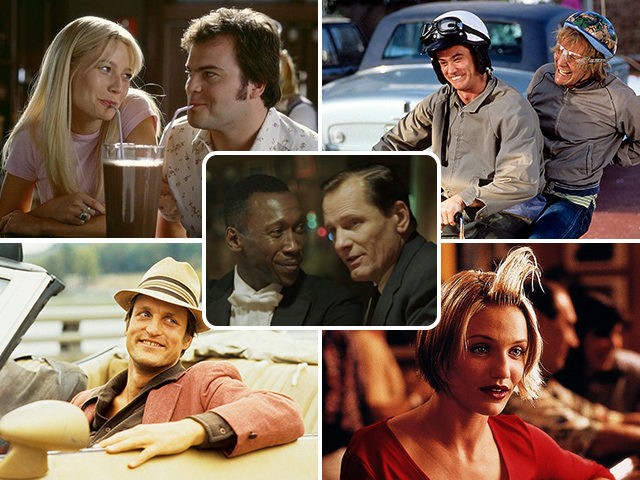It wasn’t until Green Book faced a wave of backlash that I realized the feel-good dramedy — which upset critical darlings Roma and BlacKkKlansman (literally upset) Sunday night for the Best Picture Oscar — was directed by Peter Farrelly.
Peter Farrelly, as in “The Farrelly Brothers.” Peter Farrelly, as in the man behind some of the most iconic comedies of the 20th century. In a year where I had seen precisely none of the Academy’s Best Picture nominees, I can at least walk away with the satisfaction of Dumb & Dumber’s creator receiving the honor — much like Scorsese’s win for The Departed had much less to do with The Departed than his earlier, snubbed works.
And what an arc for Farrelly’s career — an unknown who made it big directing a classic comedy, hit a serious slump while still showing glimpses of genius, then nailed the landing on a transition to serious filmmaking. There’s a curious parallel in his work and his competition over the weekend, Adam McKay. The Vice director can claim something like that story, but he’s really only had one great film, which came of his existing relationship with an established film star. The Farrellys convinced Jim Carrey to take on their debut project as a stranger.
Right out of the gate, they hit it big with Dumb & Dumber; Kingpin wasn’t a hit with critics but has held up over time; and There’s Something About Mary set the template for the 2000s’ heart-filled gross-out comedies like American Pie, The 40-Year-Old Virgin, and The Hangover. McKay struck gold with Anchorman, slumped hard with Talladega Nights (I remember my excitement seeing it opening weekend, laughing once at the fake Eleanor Roosevelt quote in a title card, then waiting through the credits for another decent joke), and made some money with Step Brothers despite being a niche picture for rich, white SoCal malcontents.
The main difference between Farrelly and McKay is that the latter, who got his start with SNL, was a one-trick comic pony: improv, improv, improv, editing. Lightning will only strike with that formula once or twice in a lifetime, and — more often than not, it just turns out dull (see also: Ghostbusters 2016). The Farrellys were a fount of ideas for visual gags: in Dumb & Dumber alone, you had the dog van flying over a hill, Lloyd’s shopping spree, the taped bird head, the heart in a takeout bag, Lauren Holly’s headlights — and that’s just the first half.
Of course, for both directors, the good times didn’t last forever. The Other Guys was painfully unfunny, like much of the output on his web project Funny Or Die. Anchorman 2 had exactly one memorable moment, given away in a trailer. And Farrelly, despite the well-received Shallow Hal, put out some of the most reviled comedies of the past decade-ish with The Heartbreak Kid, Hall Pass, and the anthology of envelope-pushing tastelessness Movie 43. However, Farrelly showed he hadn’t lost his touch with his 2012 adaptation of The Three Stooges and the better-than-expected Dumb & Dumber To.
Both McKay and Farrelly saw Oscar nominations for their first forays into serious filmmaking. The Big Short, a worthy exposé of the corrupt world of finance, is much better viewing as YouTube clips separated from the stock-photo slideshow interludes. Unfortunately, based on my colleague John Nolte’s review, McKay doubled down on those cloying techniques in Vice. And ultimately, the big issue with McKay, whose HBO series Succession was playing as Vice was in post-production, still hasn’t called his doctor about the hate-boner he’s had since 2004. Succession is a thinly-veiled hate letter to Rupert Murdoch, Vice a naked hate letter to its title character. Just like Kerry-Edwards bumper stickers, McKay keeps holding on to these bygone boogeymen out of pure spite. From the fullness of his heart, his scripts speak pure hatred and smug superiority.
It’s no wonder, then, that the optimistic Green Book beat out Vice, BlacKkKlansman, and Roma. Vice and the other wide-release films never had much of a chance; BlacKkKlansman advocates admit it isn’t Spike Lee’s best work, but the Trump-Charlottesville smear at the end sealed the deal; and Roma was undermined both by Alfonso Cuarón’s over-representation at past Academy Awards plus the old guard’s simmering resentment at how Netflix is destroying the cinema. Thus, the woke crowd was sufficiently split for the industry normies to cast an honest vote for an uplifting, non-pretentious ode to racial unity.
Having slept through the ceremony, that’s not a bad outcome to wake up to. And finally, we have justice for Lloyd Christmas — plus, in some small way, all the other era-defining films of the ’90s that were snubbed simply because they were comedies.

COMMENTS
Please let us know if you're having issues with commenting.